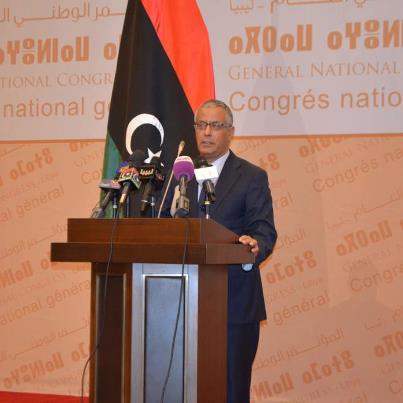By Ahmed Elumami.

Tripoli, 7 January 2014:
The General National Congress was blockaded this afternoon by protestors demanding that it pass . . .[restrict]a vote withdrawing confidence in Prime Minister Ali Zeidan. Members were prevented leaving by the protestors – estimated at around 100 – unless they voted to sack Zeidan.
The situation was chaotic. Some members who had left the building after the morning session were called back. Others were prevented from returning, ensuring that there were insufficient numbers to vote on any withdrawal motion. For one to succeed, 120 members must vote in favour.
In any event, the evening session, at which Zeidan’s tenure had been due to be discussed, was cancelled. Instead, members in the building were left negotiating an end to the standoff with the protestors, who were unarmed.
No one was hurt in the action.
Independent Congressman Sulaiman Mabrouk Al-Haj who represents Al-Jmail told the Libya Herald that the protestors had moved to the building after he and other members had left for a meeting at the Prime Ministers’ office.
“We had finished the first sitting and then went out for a meeting at the Prime Ministry but then we were shocked to hear that a group of protesters – they were almost 100 – had beseiged the headquarters of Congress.” He said that he and others returned but then the protestors would not allow him to take his car from the Congress car park.
It has been reported by some elements in the Libyan media that the protesters are linked to the movement that supported the Political Isolation Law which Congress voted for last May. Similar direct action to pressurise it into passing the law was used at the time.
However, a member of the group that coordinated support for the Isolation Law, Jamal Zubia, told the Libya Herald that the claims were untrue.
Today’s protesters, he said, were from towns and cities from across Libya “who had enough of the poor performance of the government and the Congress”.
The action was not wholly unexpected. The Libyan Revolutionaries Operations Room had given Congress an ultimatum about sacking Zeidan and last week, in a carbon copy of the tactics used to force the Political Isolation Law vote, a group calling itself the “Honourable People of Libya” seized the Foreign Ministry building demanding that Congress remove Zeidan.
There has also been a growing head of steam among Congress members to remove him. Last month, 72 of them tabled a motion to withdraw confidence in the government and to form a crisis administration.

There was wide public expectation, in fact, that there would be a vote on Sunday. In the event it did not happen. Instead, Congress asked its various committees to discuss the matter and report back today.
At this morning’s sitting, the various political groups and the independents were given time to discuss a withdrawal of confidence, the plan being that at the evening session there would be a fuller debate on the performance of the Prime Minister and government, with suggestions as to who might replace him.
One much-respected Benghazi Congressman who did not want to be named told this paper today that that there was agreement among sufficient Congress members to make a confidence vote effective that Zeidan should go. However, he added, it was also accepted that this should only be done when there was agreement on who would replace him. Congress, he said, knew it had to avoid the chaos that would occur if there were no prime minister.
The problem, he said, was that there was no obvious replacement waiting in the wings.
The Prime Minister has constantly said that he will go if Congress decides to withdraw confidence in him, but not before. [/restrict]










